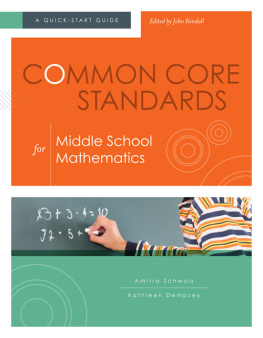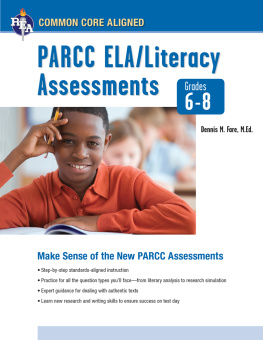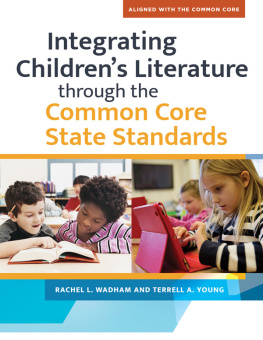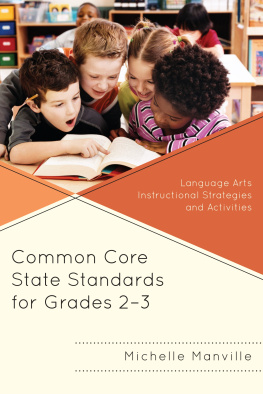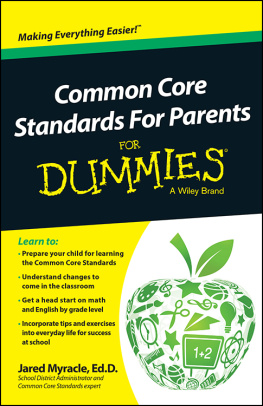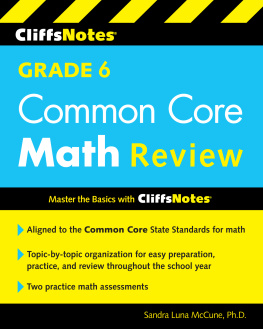Leading the
Common Core
State Standards
To everyones children
Leading the
Common Core
State Standards
From Common Sense to Common Practice
Cheryl A. Dunkle
Foreword by Douglas B. Reeves


FOR INFORMATION:
Corwin
A SAGE Company
2455 Teller Road
Thousand Oaks, California 91320
www.corwin.com
SAGE Publications Ltd.
1 Olivers Yard
55 City Road
London EC1Y 1SP
United Kingdom
SAGE Publications India Pvt. Ltd.
B 1/I 1 Mohan Cooperative Industrial Area
Mathura Road, New Delhi 110 044
India
SAGE Publications Asia-Pacific Pte. Ltd.
3 Church Street
#10-04 Samsung Hub
Singapore 049483
Acquisitions Editor: Arnis Burvikovs
Associate Editors: Desire Bartlett and Joanna Coelho
Editorial Assistant: Kimberly Greenberg
Project Editor: Veronica Stapleton
Copy Editor: Terri Lee Paulsen
Typesetter: Hurix Systems Pvt. Ltd.
Proofreader: Scott Oney
Indexer: Sheila Bodell
Cover Designer: Edgar Abarca
Permissions Editor: Karen Ehrmann
Copyright 2012 by Corwin
All rights reserved. When forms and sample documents are included, their use is authorized only by educators, local school sites, and/or noncommercial or nonprofit entities that have purchased the book. Except for that usage, no part of this book may be reproduced or utilized in any form or by any means, electronic or mechanical, including photocopying, recording, or by any information storage and retrieval system, without permission in writing from the publisher.
All trade names and trademarks recited, referenced, or reflected herein are the property of their respective owners who retain all rights thereto.
Printed in the United States of America
Library of Congress Cataloging-in-Publication Data
Dunkle, Cheryl.
Leading the common core state standards: from common sense to common practice / Cheryl Dunkle.
p. cm.
Includes bibliographical references and index.
ISBN 978-1-4522-0392-8 (pbk.)
1. EducationStandardsUnited States. I. Title.
LB3060.83.D87 2012
379.158dc23
2012002618
This book is printed on acid-free paper.
12 13 14 15 16 10 9 8 7 6 5 4 3 2 1
Contents
Foreword
Douglas B. Reeves
Foreword
I n this thoughtful and immensely practical book, Cheryl Dunkle brings the Common Core State Standards to life. For those readers who, like Cheryl, experienced the dawn of the standards movement two decades ago, it will be comforting that our profession has learned a few things since the days of dumping three-ring binders full of standards documents at the schoolhouse door and telling teachers to read em and weep. If the experiment of 50 sets of standards for 50 states taught us anything, it is the essential message that standards documents alone are insufficient to influence educational progress. Although the establishment of the Common Core represents an essential first step toward a clearer definition of what students should know and be able to do, it is insufficient to enact the teaching and leadership changes essential to implement the Common Core. That is what this book is all about, with the author providing three essential challenges to move us from theory to practice.
First, Dunkle challenges us to rethink the premises of teaching, knowing that the delivery of the content of standards is but a small part of the task ahead of us. Certainly content expertise is important, as the expectations the Common Core make on teachers require greater and more specific expertise at earlier grades than at any time in our educational history. Kindergartners will be writing, 5th grade students will be doing pre-algebra, and middle school students will be composing more advanced essays and engaging in deeper critical thinking than ever before. But content expertise is a necessary but insufficient condition for success. Dunkle reminds us that great teachers need effective leadership support. Contrary to the prevailing political winds of educational leaders as those who can quickly rate, rank, sort, and humiliate teachers, the author challenges leaders to inspire, innovate, and implement. Leaders must collaborate with teachers to achieve the depth and rigor of the most effective instructional practices, a discipline that requires focus and energies that elude many preoccupied school administrators and overwhelmed classroom educators.
Second, these pages place the burden of transforming the Common Core into effective curriculum and assessment precisely where it belongson the daily work of teachers and school leaders. We cannot afford to wait for any national group, however well-intentioned and sophisticated, to replace the daily work of teaching. Although the Common Core represents a step forward in clarity and focus compared to many previous standards documents, standards without accompanying curriculum and assessments will be a muddle. The essential question is not merely What do the standards say? but rather What evidence must students provide that they are proficient? The definition and generation of that evidence remains an obligation of the professionals in every school. Dunkle provides a thoughtful framework for these discussions, but her advice does not preclude the necessity for the difficult conversations that lie ahead. Among the many warning signs that the first generation of academic standards were headed for trouble was when teachers sighed, I give upjust tell me what to do. When teachers disengageintellectually and emotionallyfrom the implementation of standards, then schools are left with the illusion of education. Grand vision and mission statements, bold standards, and lofty rhetoric will yield only frustration if the people responsible for getting the job done are disrespected, disengaged, and disenfranchised. They are not merely the recipients of standards, but the architects of their implementation.
Third, Dunkle confronts policy makers and educational leaders who might otherwise succumb to the mirage of standards-based tests as a substitute for meaningful educational accountability. This is the central challenge of our time, as we recover from a decade of equating educational success with standardized test scores. However promising the Common Core may be, they are only a fraction of the equation when schools consider the profoundly important question of what makes for effective teaching, learning, and leadership. The author reminds us that while student proficiency in the Common Core is essential as a matter of securing our nations future, the accountability for that success is not merely the sum of the test scores of children, but rather the product of a complex set of variables that includes the adultsparents, teachers, and school leaders.
Cheryl Dunkle has devoted a lifetime to supporting the ideals expressed in this book, and readers who take the time to study, discuss, and learn from her years of wisdom will find their investment of time and energy well rewarded.
Douglas B. Reeves
Boston, Massachusetts
Preface
I can never fear that things will go far wrong
where common sense has fair play.
Thomas Jefferson
FROM COMMON SENSE
This book has been rattling around in my head for years. My work as a classroom teacher, practicing principal, professional development consultant, and college instructor has brought me to this point in my thinking about school leadership and the educational transformations that are critical for our students to learn more successfully and our teachers to teach more effectively. The impetus for me to actually pick up a pen and plug in my computer to convey some ideas and thoughts on a page resurfaced when the Common Core State Standards (CCSS) were recently adopted by 46 states and the District of Columbia. Now I feel compelled to write.
Next page

